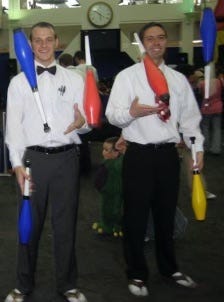How to make the most of your college experience, avoid being lonely, and why you should prioritize professors over class subjects
Confession Time: I was the President of the Juggling Club
When I stepped onto campus at Brigham Young University as an 18-year-old freshman, I was blown away with the size of the school (30k students!), the array of interesting classes (like History of Creativity and Witchcraft and Magic in the Middle Ages), and all the interesting clubs (like Ping Pong Club or Fencing Club). But one caught my eye…
Juggling club.
It was just a group of people who got together and juggled. That’s it. I dragged some of my friends to it, and before I knew I was juggling balls, clubs, knives, and flaming torches. I was a natural.
The next year we sat in a semicircle to choose our next president. I sat between a guy in a duct-taped vest with rubber ducks glued on it and a girl who regularly wore her ComicCon outfit. I wore a polo shirt and next to them seemed pretty normal. I was nominated by my friend and won the vote. I stayed as the president for the next three years, performing in parades, university events, and even BYU volleyball and basketball games.
As nerdy as it sounds (and it was) it was a highlight of my university experience. I considered everyone in the club my friend, taught hundreds of people how to juggle, only caught myself on fire once torch juggling, and felt like I belonged.
A big part of college is about finding your place. The space that is the intersection of your unique interests and skills. This article is about how to go about doing just that.


Clubs, Sports, & Extracurricular Activities
When most people think of college they typically think of their major and/or specific classes they take. However, these aren’t usually the places to find what makes you tick. As intellectually invigorating as a good college course can be, they can sometimes be a bit “one size fits all”. If you want to truly find what’s unique to you, we’d suggest a different place to look: extracurriculars.
Extracurriculars (clubs, sports, volunteering, etc.) are fantastic venues for exploring and developing skills and interests you didn’t even know were important to you. They’re also wonderful places to build deep friendships (and a network) with other smart students who are interested in the same things you are.
All schools offer non-academic activities. Here’s a fairly exhaustive list of what most schools offer:
- Fun Classes: You can take classes for fun, such as racquetball, dance, art, history, religion, or other classes. My personal favorite was bowling class, where I learned how to put spin on the ball both ways.
- Clubs: There are so many clubs to choose from: ping pong, fencing, strategy, engineering, missionary preparation, environmental, etc. I would often choose a club to attend with a friend or two, such as fencing, just to try it out.
- Sports: Often called intramurals, these are sports you can join with a team or have the university create a team for you. Most sports are offered, such as basketball, softball, soccer, racquetball, etc. My intramural basketball team always tried shooting a half-court shot at the beginning of the game just to show we were there for fun.
- Events: There are so many university events! My university had weekly forums where they brought in interesting speakers, regular spirit weeks, club events, bubble runs, and many others. More than just attending, you can volunteer for these and really get involved.
- Case Competitions: Many companies do something called case competitions for students, where they give them a problem to solve and you work over a short period of time on that project. This can range from engineering a new toilet, to solving poverty in a city, to creating a new line of men’s fragrances (I did the last one). You often win prize money and sometimes even an internship, which makes these potentially great career accelerators.
- Volunteering: Colleges have opportunities to serve nearly every week, from a river pickup to handing out shirts. I volunteered for two years at a local elementary school’s before-school program, where I played games with kids who were dropped off before school.
- Dinner Groups: Many students form dinner groups, where they take turns preparing dinner for the group. This is a great way to save money and have a regular group of people to eat with.
Looking back on my university experience I most remember these extracurriculars and hardly remember my classes. These extracurriculars helped me get 3 internships, none of which I would have gotten had I just attended my classes and not gotten involved. This led to me landing my dream job after college.
Stop Being Lonely!
Most students struggle with being homesick, making friends, or feeling like they belong. That’s normal. For most freshmen it’s the first time in their lives that they’ve truly ever been on their own without the built-in support structure of their home neighborhood, family, or high-school. Many of their old friends may not even be attending the same university as they are and they are “starting from scratch” socially.
Thankfully all of this is within your control.
Here’s three important things to remember when going to college:
Live close to campus with other students. Even if you can still live at home, live with a relative, or have some other financially advantageous set-up, it is well worth it to live close to campus with other students. You’ll build lifelong friendships with a built-in friend group. I lived with 5 other people (yes, six total) in a small apartment close to campus and loved it. There was always someone home. I could walk across the hall and watch TV with other friends or have an interesting conversation with a roommate in the living room. I don’t remember once feeling alone when I was home. Prioritize new relationships over saving a few dollars on rent.
Working in college is fine, but don’t work full-time. As a former student and now professor, I see students trying to do it all. They take a full course load and then try to work full-time. This is often justified with them needing to pay for school, and I totally get it. I had to pay for school too. However, working full-time during college comes with a cost. Full time work means you sacrifice all of the extracurricular and potential relationship building that is so critical in college. This defeats much of the purpose of going to college in the first place.
I would say nearly all college students can live off of student loans, a part-time job, and working full time in the summer. Student loans can be paid off when you graduate and are earning an 86% higher income than you were making in school. Remember that college is an investment, and it’s not simply a financial one, so don’t make the mistake of sacrificing education + personal development just to save some short term costs. There is a real opportunity cost to missing out on a true college experience.

Study effectively and take breaks often. Grades matter to maintain scholarships, get into grad school, and for your mental well-being (example: I’m wired in a way where I’m not satisfied with giving a mediocre effort in anything), but there are diminishing returns to studying. If you spend 100% of your time in the books, you’ll actually miss out on much of the broader education and developmental experiences that campus life offers. Find an effective way to study that allows you to still have a life. My rule was I would study straight for 50 minutes, then reward myself with 10 minutes of surfing the web or texting. And I would make a point to be done by dinner. This not only served me well in college but has been a helpful practice later in life (read more in A Real Day of a Marketing VP, Professor, Husband, and Father of 4 Young Children).
Choose Professors, Not Courses
There are so many interesting classes in college. Just check out some of these courses:
- The Joy of Garbage – Santa Clara University
- Witchcraft and Magic in the Middle Ages – Harvard University
- The Science of Superheroes – University of California, Irvine
- Elvish, the Language of “Lord of the Rings” – University of Wisconsin-Madison
- The Mathematics of LEGO Bricks – Massachusetts Institute of Technology (MIT)
- The History of Creativity – Brigham Young University

While these likely are truly interesting classes (I mean, if you’re the professor who came up with these then you’re bound to be interesting), but the reality is that in most colleges everyone also needs to take core classes like biology, history, and math. When choosing these foundational courses you usually have options within a field, such as microbiology, cell biology, biochemistry, or genetics.
The temptation usually is to select the course material that seems most captivating. Our advice is different: instead of just choosing the most interesting class, you should research the professors and simply choose the course with the best teacher.
The hard truth is universities are set up and incentivized to prioritize professors doing research, with teaching as secondary. This system often creates professors who are amazing researchers and experts in their field, but who are thoroughly mediocre (or even downright awful) teachers. Many of these professors are only teaching classes because they’re required to do 1-2 per semester. Don’t take their class! Even if it sounds interesting! Read course and professor reviews before you sign up.
Looking back on my college education, I seriously regret taking a geology course, as the professor just read off the slides in a dark classroom. I also regret taking calculus, as the professor just wasn’t engaging and left most of the teaching to her TAs in separate study sessions. I should have read the reviews and taken the courses from someone else, or taken different courses altogether. I never use calculus!
Research and teaching are 2 very different skill sets. What you want to find is a professor who is renowned for being able to explain things in ways that really open up your mind, even on topics that seem completely mundane. As an example, one of my favorite teachers during my MBA program was a professor of accounting (perhaps the most stereotypically boring subject in existence). But he was a master teacher and one of the most popular professors in the business school because he had an almost magical ability to take something like accounting and make it easy to understand and even fascinating. We all loved him.
Conclusion
If you can remember that college is truly about identifying what drives you, building lifelong friendships, and learning how to think, it makes it infinitely easier when choosing where to spend your time and money. Most of us (myself included) look back on college with great fondness because it was one of the only times in my life when I could focus explicitly on developing myself. Don’t squander that opportunity by simply going through the motions of “getting good grades” or “working full-time to make ends meet”.
Perhaps the most important lesson you can learn from college is this: Life is what you make it out to be. Enjoy every minute of it.


